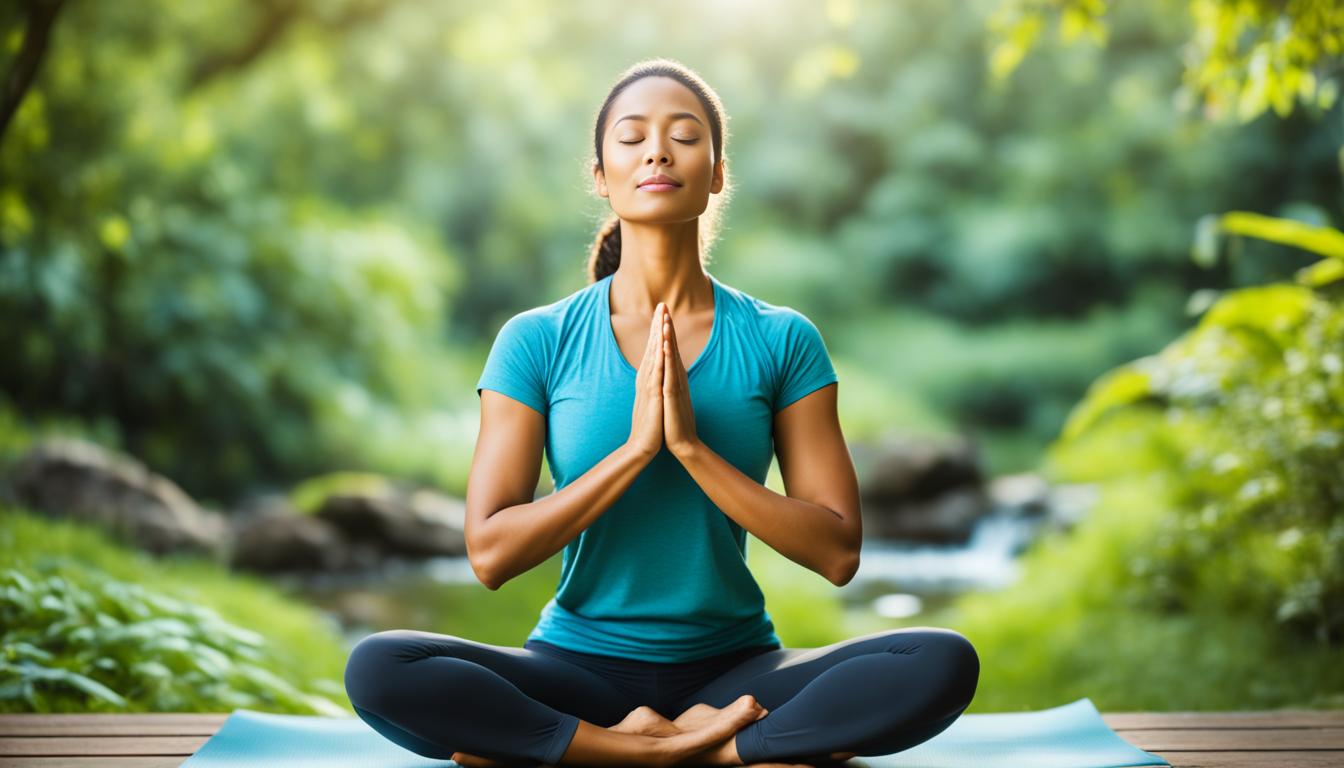If you’re looking to start your journey into the world of yoga, you’ve come to the right place. Beginner’s yoga is the perfect way to introduce yourself to this ancient practice and reap its numerous benefits. Whether you want to improve your flexibility, destress, or simply incorporate some mindful movement into your routine, yoga for beginners is the ideal starting point.
Practicing beginner’s yoga doesn’t require any previous experience or a fitness background. It’s designed to be accessible to everyone, regardless of age, body type, or fitness level. You can easily follow along with easy yoga poses for beginners right in the comfort of your own home.
By incorporating a beginner yoga routine into your daily life, you’ll gradually build strength, improve flexibility, and cultivate mindfulness. The gentle movements and stretches will help you unwind, relax, and develop a deeper mind-body connection.
Whether you’re a busy professional, a stay-at-home parent, or someone looking for a new form of exercise, beginner yoga classes offer a welcoming and supportive environment. Qualified instructors will guide you through each posture, ensuring proper alignment and offering modifications to suit your individual needs.
In this article, we’ll explore the world of beginner’s yoga, from the foundational poses to helpful tips and insights. So, let’s begin our journey and discover the transformative power of yoga for beginners.
Key Takeaways:
- Beginner’s yoga is a great way to start your yoga journey, regardless of your fitness level.
- You can practice yoga for beginners in the comfort of your own home or join beginner yoga classes for added guidance and support.
- Starting a beginner yoga routine offers numerous benefits, including improved flexibility, strength, and mental well-being.
- Yoga poses for beginners are designed to be accessible, and modifications can be made to accommodate individual needs.
- Embark on your yoga journey today and experience the positive impact it can have on your mind, body, and overall well-being.
The Benefits and Myths of Beginner’s Yoga
Beginner’s yoga is a wonderful practice that offers a multitude of physical and mental health benefits. By incorporating yoga into your routine, you can experience a significant reduction in stress, anxiety, and depression. Yoga has also been shown to improve working memory and cognitive function, enhancing your overall mental well-being.
In terms of physical health, beginner’s yoga can do wonders for your body. Regular practice can help improve your flexibility, strength, and balance, leading to an overall improvement in your physical fitness. Additionally, yoga can help alleviate chronic pain and promote a better quality of life.
Contrary to popular myths, yoga is not just for the flexible or those who adhere to a specific religion. It is a practice that welcomes everyone, regardless of their fitness level, flexibility, or beliefs. You don’t need a lot of time or complicated moves to begin your yoga journey. All you need is a willingness to try something new and a desire to take care of yourself.
“Yoga is an inclusive practice that can be adapted to suit your individual needs and goals.”
Embarking on a beginner’s yoga practice can be intimidating, especially if you believe in the myths surrounding it. However, it’s important to remember that yoga is a personal journey, and everyone’s experience is unique. Don’t let misconceptions hold you back from reaping the amazing benefits that yoga has to offer.
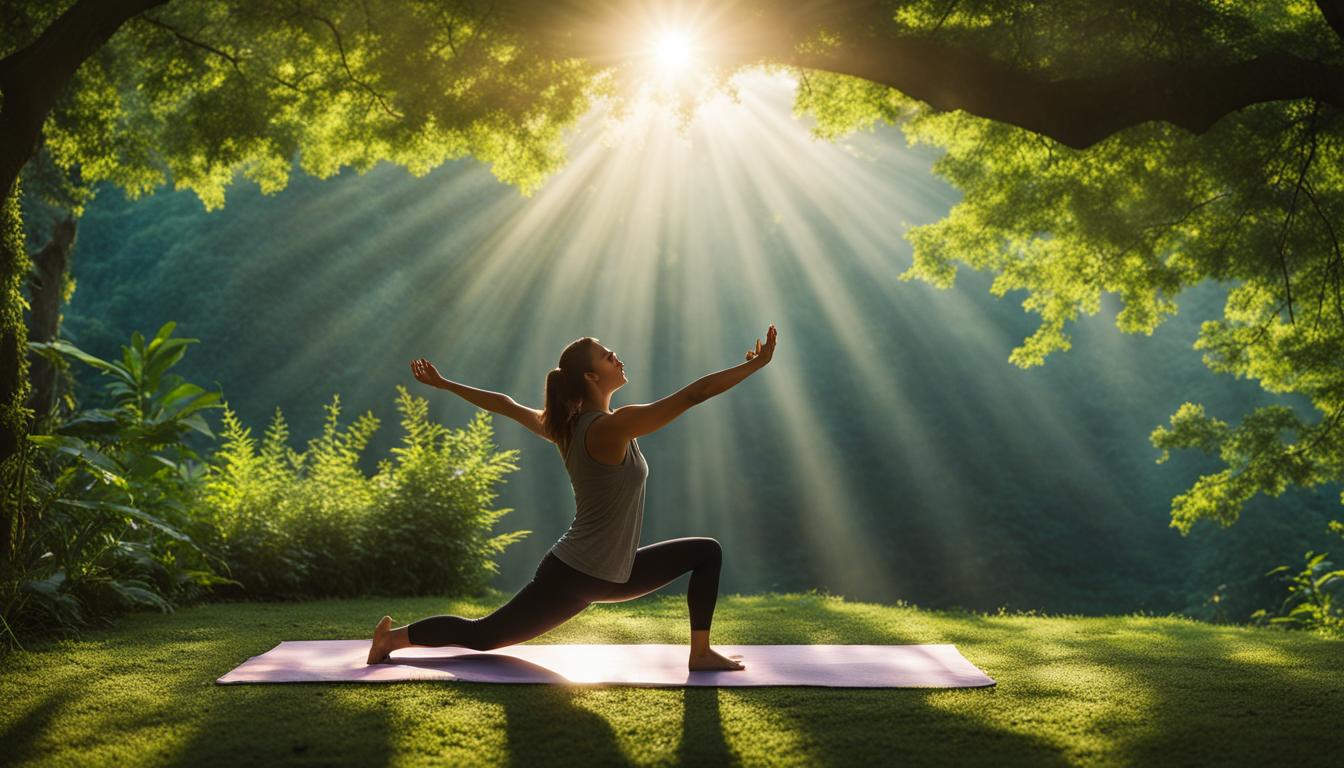
Understanding Basic Yoga Terms for Beginners
As a beginner on your yoga journey, it’s important to familiarize yourself with basic yoga terms. By understanding these terms, you’ll be better equipped to navigate classes or videos and communicate with instructors and fellow yogis. Here are some fundamental yoga terms for beginners to know:
Asana
An asana refers to a yoga posture or pose. Each asana has specific physical and mental benefits and is often accompanied by focused breathing.
Ayurveda
Ayurveda is an ancient system of medicine that originated in India thousands of years ago. It emphasizes the balance between mind, body, and spirit for optimal health and well-being.
Mantra
A mantra is a word or sound repeated during meditation to help focus the mind and achieve a state of tranquility and inner peace. Common mantras include “Om” and “Om Shanti.”
Mudra
A mudra refers to a symbolic hand gesture that is believed to influence the flow of energy in the body. Mudras are often used during meditation and yoga practice to deepen concentration and enhance spiritual connection.
Namaste
Namaste is a salutation commonly used at the end of a yoga class or as a general greeting. It translates to “I bow to the divine in you” and symbolizes respect and acknowledgement of the inner light in oneself and others.
Pranayama
Pranayama is the practice of controlling life energy, or prana, through breath. Breathing exercises and techniques are integral to yoga practice and can help calm the mind, increase energy, and promote overall well-being.
By familiarizing yourself with these basic yoga terms, you’ll have a deeper understanding of the philosophy and practices that underpin this ancient tradition. Now, let’s delve further into how yoga props can enhance your beginner yoga practice.
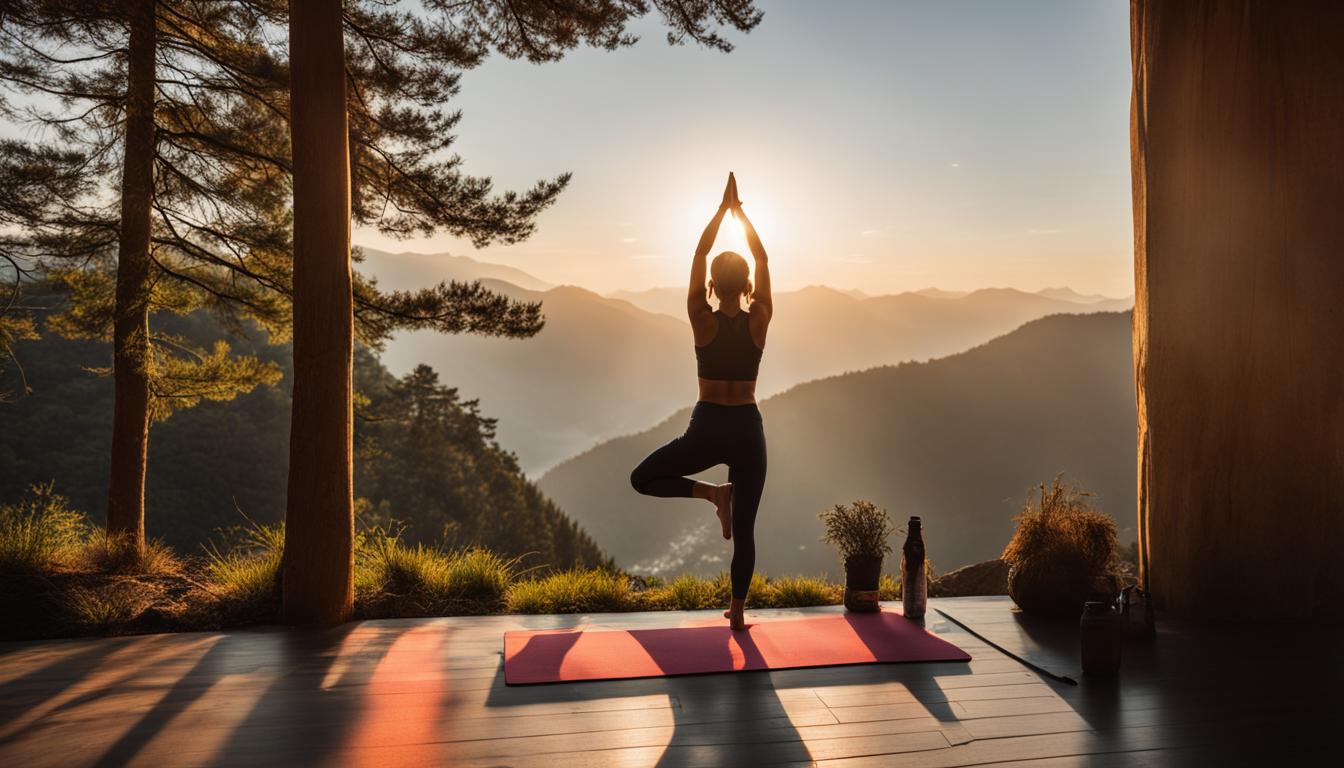
Using Props to Enhance Your Beginner Yoga Practice
Props can be valuable tools for beginners to enhance their yoga practice. They provide additional support, aid in alignment, and help deepen stretches. Incorporating props into your beginner yoga routine can make the practice more accessible, comfortable, and beneficial for your body.
One commonly used prop is the yoga block. These blocks are typically made of foam or cork and can be used to support your hands, feet, or seat during various poses. For beginners, blocks can help with proper alignment, allowing you to comfortably reach the floor or maintain stability in challenging positions.
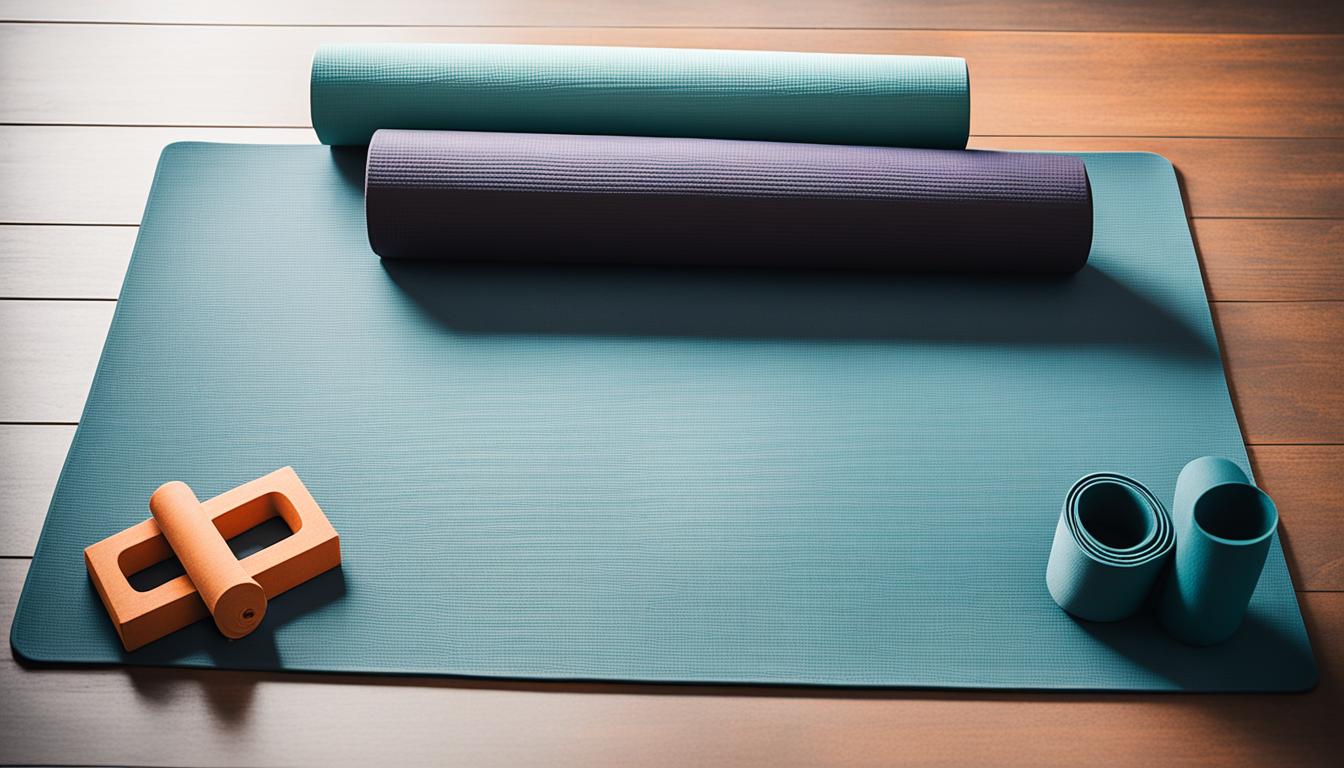
Another useful prop for beginners is the yoga strap. This adjustable strap can assist in deepening stretches and increasing flexibility. By wrapping the strap around your feet or limbs, you can gently extend your reach and hold poses for longer periods, gradually improving your flexibility over time.
Blankets and bolsters are additional props that provide support and comfort during yoga practice. Blankets can be folded and used as a cushion under the knees or hips, offering extra padding for sensitive areas. Bolsters, on the other hand, are large, firm pillows that can be used for restorative poses, providing gentle support and promoting relaxation.
Props are not only limited to yoga studios but can also be utilized at home to enhance your practice. They can aid in balance, alignment, and flexibility, allowing you to explore different poses with confidence and ease. Discovering the right props for your practice can be a personal journey, and it’s essential to choose ones that best suit your needs and preferences.
Finding the Right Yoga Clothes and Mat for Beginners
When starting your beginner’s yoga practice, it’s important to choose the right clothing and yoga mat to enhance your experience. Wearing comfortable clothes that allow for ease of movement is key. Depending on the style of yoga you choose, different types of clothing may be more suitable.
For hot yoga, lightweight and sweat-wicking clothes are recommended to keep you cool and dry. Loose-fitting and comfortable attire is ideal for hatha and restorative yoga, allowing for unrestricted movement and relaxation. If you prefer dynamic practices like vinyasa or power yoga, opt for form-fitting activewear that provides support and flexibility.
Remember, the goal is to feel comfortable and confident in your yoga clothes, enabling you to focus on your practice without distractions.
Choosing the right yoga mat
Equally important as wearing the right clothing is selecting the appropriate yoga mat. A well-suited mat will provide stability and grip during your poses, allowing you to fully engage in your practice.
Consider the style of yoga you’ll be practicing when choosing your mat. For hot yoga, where you can expect to sweat profusely, a non-slip mat with superior grip is essential to prevent slipping and provide a secure foundation. On the other hand, for practices like vinyasa and power yoga that involve quick transitions and more intense movements, a medium thickness mat offers the perfect balance of cushioning and stability.
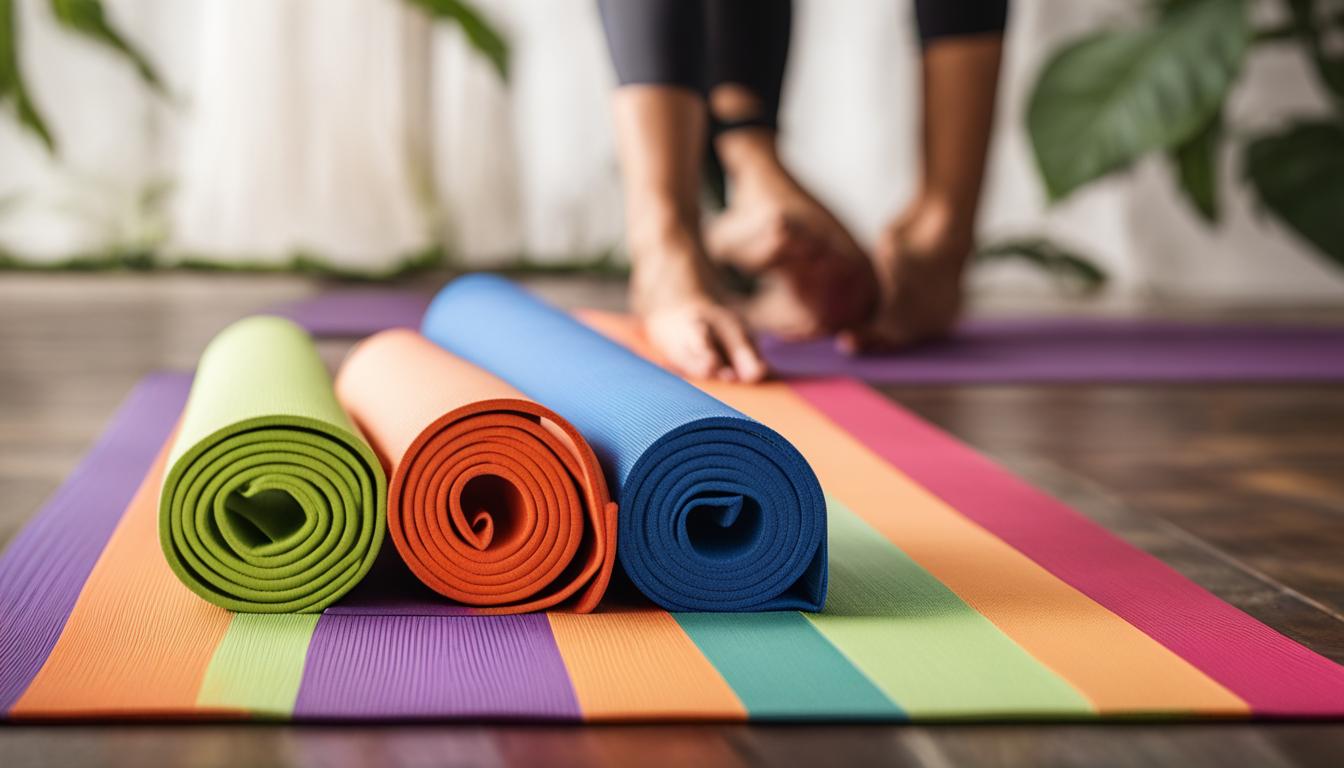
Investing in a high-quality yoga mat that suits your needs will enhance your practice and ensure your comfort and safety throughout.
Conclusion
Embarking on a beginner’s yoga practice is the first step towards a healthier, more balanced life. By delving into the world of yoga, you open yourself up to a myriad of benefits for both your mind and body. Yoga for beginners is not just about stretching and flexibility; it is a practice that helps cultivate mindfulness, strength, and inner peace.
As you start your yoga journey, remember to prioritize proper breathing techniques, as this will help you connect with your body and find a calm and centered state of mind. Maintaining good posture during your practice is essential to prevent injury and maximize the benefits of each pose. Don’t be afraid to use props such as blocks, straps, and blankets to support and deepen your practice. These tools are there to assist you in finding comfort and alignment.
Patience and self-compassion are key as you navigate your beginner’s yoga practice. Embrace the process, and don’t compare yourself to others. Each person’s journey is unique, and progress will come with time and consistent effort. Whether you choose to join a beginner yoga class at a local studio or start your practice at home, the important thing is to take that first step and begin your yoga journey today. You have everything you need to embark on this transformative path towards self-discovery and inner wellbeing.
FAQ
What are some essential techniques for beginners to start their yoga journey?
Some essential techniques for beginners include proper breathing, maintaining proper posture, practicing Sun Salutations, performing Downward-Facing Dog, and trying the Child’s Pose.
What are the physical and mental health benefits of beginner’s yoga?
Beginner’s yoga offers numerous benefits, including reducing stress, anxiety, and depression, improving working memory, enhancing overall physical fitness and quality of life, and relieving chronic pain.
Do I need to be flexible or adhere to a specific religion to practice yoga?
No, you don’t need to be flexible or adhere to a specific religion to practice yoga. Yoga is an inclusive practice that welcomes everyone, regardless of their flexibility or beliefs.
What are some important yoga terms that beginners should know?
Some important yoga terms for beginners include asana (yoga posture or pose), Ayurveda (an ancient system of medicine), mantra (a repeated word or sound for meditation), mudra (a symbolic hand gesture), namaste (a salutation meaning “I bow to the divine in you”), and pranayama (the practice of controlling life energy through breath).
How can props enhance a beginner’s yoga practice?
Props can be valuable tools for beginners, as they can aid in balance, alignment, and flexibility. Yoga blocks can help with proper alignment, straps can assist in deepening stretches, and blankets and bolsters can provide support and comfort.
What kind of clothing and mat should beginners use for yoga?
Beginners should wear comfortable clothing that allows for ease of movement. The type of clothing may vary based on the style of yoga, such as lightweight and sweat-wicking clothes for hot yoga, loose-fitting and comfortable attire for hatha and restorative yoga, and form-fitting activewear for vinyasa and power yoga. Additionally, choosing the right yoga mat is essential for stability and grip during poses.
Source Links
- https://yogainternational.com/article/view/beginner-yoga-journey
- https://youaligned.com/yoga/beginner-yoga-4-simple-steps-start-journey/
- http://www.brioleisure.org/blog/5-essential-yoga-techniques-for-beginners

